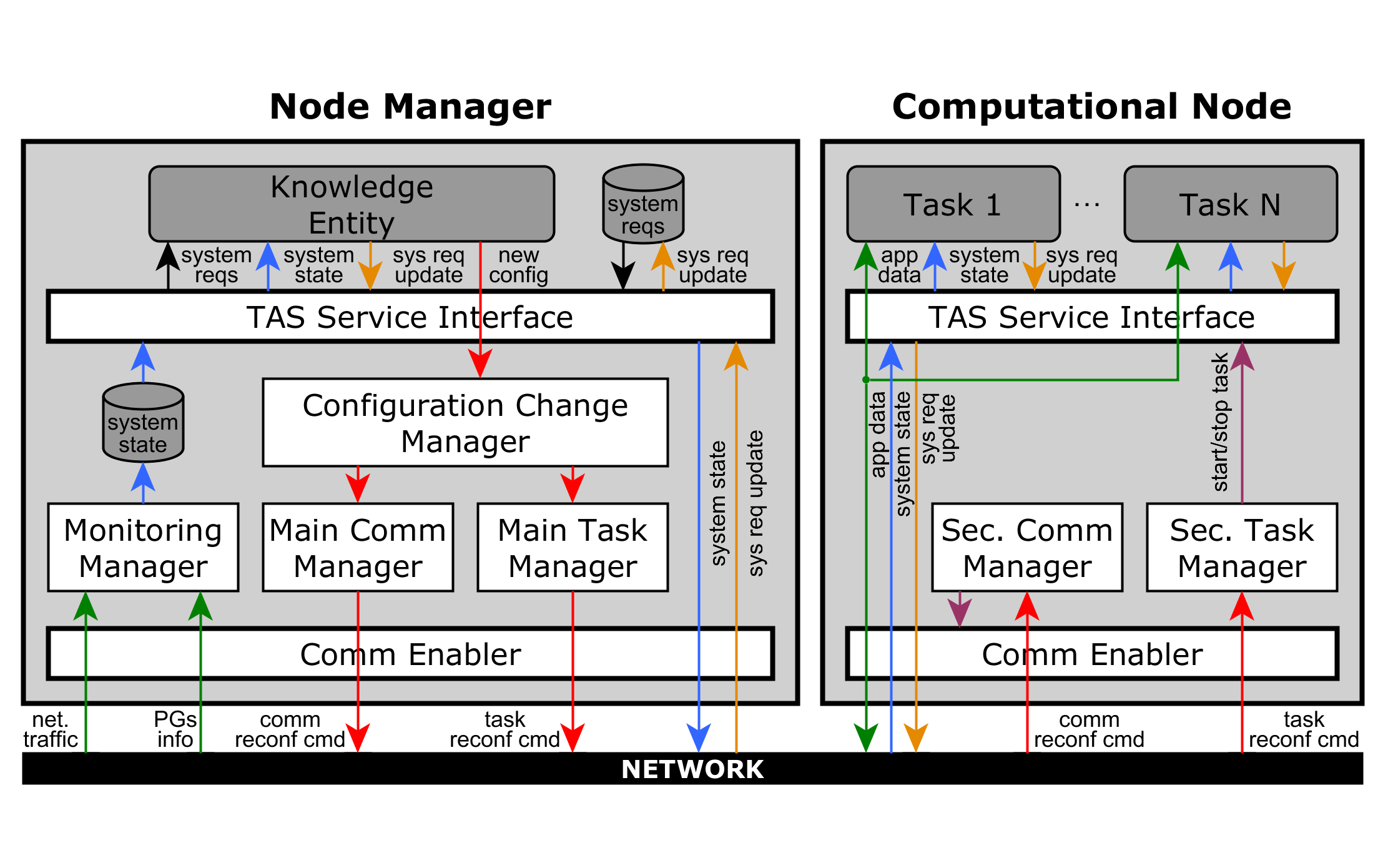DFT4FTT - Dynamic Fault Tolerance for increasing the adaptivity of highly-reliable distributed embedded systems based on Flexible Time-Triggered Ethernet
This work is supported in part by the Spanish Agencia Estatal de Investigación (AEI) and in part by FEDER funding through grant TEC2015-70313-R (AEI/FEDER, UE).
Adaptive embedded systems should be able to automatically adjust their internal strategies in response to requirement changes. They require services supporting flexibility, real time and dependability at different levels of the system architecture, which in the case of distributed embedded systems (DESs) includes the network level.
In this sense, there is still significant research pending to bring adaptivity to one of the most ubiquitous network technologies available, namely Ethernet, which is being used more and more as the underlying network technology for DESs. Specifically, there is a need for making Ethernet-based DESs capable not only of adapting to changing real-time requirements, but also of changing dependability, and especially reliability, requirements. This would allow an Ethernet-based DES to reallocate resources to make a certain more critical service more reliable if this is required. An example might be a car exposed to increased electromagnetic interference when traveling near power lines.
Making a system more adaptive in terms of reliability can be achieved through so called dynamic fault tolerance. Thus, making an Ethernet-based DES both adaptive in terms of real-time and reliability can be achieved by providing dynamic fault tolerance to Ethernet technologies that already provide services for flexible real-time requirements. One such technology is FTT-Ethernet, since it provides communication services that allow the nodes of the system to change the real-time attributes of the exchanged messages without interrupting the service provided by the system.
The goal of the predecessor project, FT4FTT-Ethernet (DPI2011-22992), was to make FTT-Ethernet highly reliable by using static, as opposed to dynamic, fault tolerance mechanisms. In contrast, this new project aims at improving FTT-Ethernet by providing it with dynamic fault tolerance mechanisms. This would allow FTT-Ethernet to be used as the underlying network for adaptive DESs that not only need to adapt to changing real-time requirements, but also to changing reliability ones.
Project Leader
Project Collaborators
-

Manuel Alejandro Barranco González
-

Alberto Ballesteros
-

Inés Álvarez Vadillo
Scientific Researcher at ABB Corporate Research, Sweden
-

David Gessner
Freelance and Science Communicator
-

Sinisa Derasevic
-

Guillermo Rodríguez-Navas
Researcher at Nokia Bell Labs
Related Publications
-
Exploring the use of Deep Reinforcement Learning to allocate tasks in Critical Adaptive Distributed Embedded Systems
-
Speeding Task Allocation Search for Reconfigurations in Adaptive Distributed Embedded Systems Using Deep Reinforcement Learning
Sensors
-
Implementación y verificación de mecanismos para tolerar fallos en el canal de comunicaciones de manera dinámica en sistemas distribuidos empotrados de tiempo real críticos basados en Ethernet
-
An Infrastructure for Enabling Dynamic Fault Tolerance in Highly-Reliable Adaptive Distributed Embedded Systems Based on Switched Ethernet
Sensors
-
Reliability Analysis of the Proactive Transmission of Replicated Frames Mechanism over Time-Sensitive Networking
Sensors
-
Time Redundancy Mechanisms for Tolerating Temporary Faults in the Communication Subsystem of Systems based on Time-Sensitive Networking Standards
Ph. D. Thesis
-
Development of a Centralized Network Controller for Networks based on the Time-Sensitive Networking (TSN) Ethernet Standards
-
Exploring the use of Deep Reinforcement Learning to allocate tasks in Critical Adaptive Distributed Embedded Systems
Proceedings of the IEEE 26th International Conference on Emerging Technologies and Factory Automation (ETFA 2021)
-
Design and Experimental Evaluation of the Proactive Transmission of Replicated Frames Mechanism over Time-Sensitive Networking
Sensors
-
CSRP: an Enhanced Protocol for Consistent Reservation of Resources in AVB/TSN
IEEE Transactions on Industrial Informatics
-
Description of the UPPAAL Models for SRP and CSRP and Verification of their Termination and Consistency Properties
arXiv:2007.15712 [cs.NI]
-
Clock Synchronization in Integrated TSN-EtherCAT Networks
25th IEEE International Conference on Emerging Technologies and Factory Automation (ETFA 2020)
-
An Architecture for Highly Reliable Fault-Tolerant Adaptive Distributed Embedded Systems
Computer
-
Comparing Admission Control Architectures for Real-Time Ethernet
IEEEAccess
-
Design, Implementation and Validation of a System to Automatically Configure the Scheduling of Real-Time Traffic in Time Sensitive Networking (TSN) Switches
-
Estudio de la idoneidad del Stream Reservation Protocol para dar soporte a Sistemas Empotrados Distribuidos Críticos Adaptativos
-
Design and Implementation of a Domotics System based on the Sentilo IoT Platform
-
First exploration of the potential of diverse training and voting for increasing the accuracy of CNNs
Proceedings of the IEEE 24th International Conference on Emerging Technologies and Factory Automation (ETFA 2019)
-
Temporal Replication of Messages for Adaptive Systems using a Holistic Approach
Proceedings of the IEEE 24th International Conference on Emerging Technologies and Factory Automation (ETFA 2019)
-
Formal Verification of the FTTRS Mechanisms for the Consistent Update of the Traffic Schedule
Proceedings of the IEEE 24th International Conference on Emerging Technologies and Factory Automation (ETFA 2019)
-
Simulation of the Proactive Transmission of Replicated Frames Mechanism over TSN
Proceedings of the IEEE 24th International Conference on Emerging Technologies and Factory Automation (ETFA 2019)
-
Towards a Dynamic Replication of Messages in a Network with Flexible Real-Time Guarantees
17th International Workshop on Real-Time Networks (RTN 2019)
-
First Analysis of the AVB’s Stream Reservation Protocol in the Context of TSN
17th International Workshop on Real-Time Networks (RTN 2019)
-
Towards a Fault-Tolerant Architecture based on Time-Sensitive Networking
4ª Edición de las Jornadas de ACM Celebrations: Informática para tod@s
-
First Description of a Self-Reconfigurable Infrastructure for Critical Adaptive Distributed Embedded Systems
-
Fault Tolerance in Highly-Reliable Ethernet-based Industrial Systems
Proceedings of the IEEE
-
Towards a Fault-Tolerant Architecture based on Time Sensitive Networking
Proceedings of the IEEE 23rd International Conference on Emerging Technologies and Factory Automation (ETFA 2018)
-
Verification of the Schedule Consistent Update Mechanisms of FTTRS with UPPAAL
16th International Workshop on Real-Time Networks (RTN2018)
-
An OMNeT++ Simulation Model for the Proactive Transmission of Replicated Frames Mechanism over TSN
Universitat de les Illes Balears
-
Towards a Self-Reconfigurable Infrastructure for Critical Adaptive Distributed Embedded Systems
16th International Workshop on Real-Time Networks (RTN 2018)
-
First Study of the Proactive Transmission of Replicated Frames Mechanism over TSN
16th International Workshop on Real-Time Networks (RTN 2018)
-
Mixing Time and Spatial Redundancy over Time Sensitive Networking
Proceedings of the 48th Annual IEEE/IFIP International Conference on Dependable Systems and Networks
-
Reconfiguration Strategies for Critical Adaptive Distributed Embedded Systems
Proceedings of the 48th Annual IEEE/IFIP International Conference on Dependable Systems and Networks (DSN 2018)
-
Current Research on Dependability Aspects of TSN at UIB
MDH Workshop on Time Sensitive Network
-
Implementation and Validation of the Fundamental Mechanisms of the Flexible Time-Triggered Communication Paradigm for Ethernet-based Highly-Reliable Systems
-
Towards a Dynamic Task Allocation Scheme for Highly-Reliable Adaptive Distributed Embedded Systems
Proceedings of the 22th IEEE International Conference on Emerging Technologies and Factory Automation (ETFA 2017)
-
Towards a Time Redundancy Mechanism for Critical Frames in Time-Sensitive Networking
Proceedings of the 22nd IEEE International Conference on Emerging Technologies And Factory Automation (ETFA 2017), Cyprus
-
Estudio del Control de Admisión en los Protocolos de Comunicación Flexible Time-Triggered y Audio Video Bridging
2ª Edición de las Jornadas de ACM Celebrations: Informática para tod@s
-
Study of the Admission Control in the Flexible Time-Triggered and the Audio Video Bridging Communication Protocols
-
A First Performance Analysis of the Admission Control in the HaRTES Ethernet Switch
Proceedings of the 21th IEEE International Conference on Emerging Technologies and Factory Automation (ETFA 2016)
-
First Implementation and Test of Reintegration Mechanisms for Node Replicas in the FT4FTT Architecture
Proceedings of the 21th IEEE International Conference on Emerging Technologies and Factory Automation (ETFA 2016)
-
Designing fault-diagnosis and reintegration to prevent node redundancy attrition in highly reliable control systems based on FTT-Ethernet
Proceedings of the 12th IEEE World Conference on Factory Communication Systems (WFCS 2016)
-
A First Qualitative Comparison of the Admission Control in FTT-SE, HaRTES and AVB
Proceedings of the 12th IEEE World Conference on Factory Communication Systems (WFCS 2016)
-
First Implementation and Test of a Node Replication Scheme on top of the Flexible Time-Triggered Replicated Star for Ethernet
Proceedings of the 12th IEEE World Conference on Factory Communication Systems (WFCS 2016)
-
Node Fault Tolerance for Distributed Embedded Systems based on FTT-Ethernet
-
Adding Fault Tolerance To a Flexible Real-Time Ethernet Network for Embedded Systems
-
Improving Maintenance of FT4FTT: Extending it to Monitor and Log its Available Redundancy via Internet
Proceedings of the 21th IEEE International Conference on Emerging Technologies and Factory Automation (ETFA 2016)


